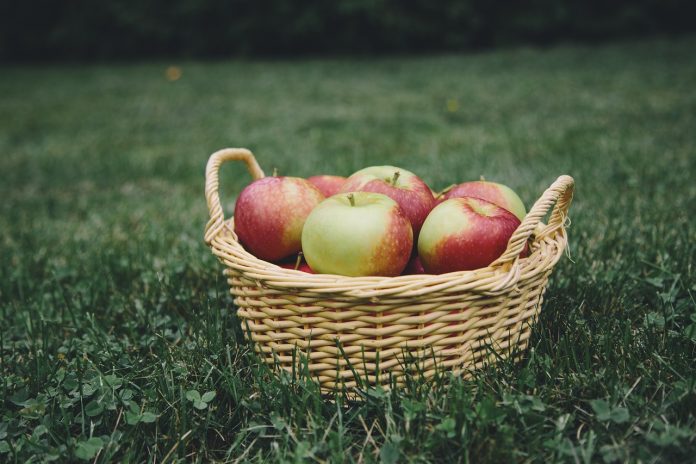“There are tricks to picking apples. Each stem has to be snapped off, not pulled out, or the fruit will rot where the skin is broken. They have to be handled gently: fingermarks make dark bruises later. They are picked into bags worn around your neck with straps over your shoulders, leaving both hands free, and the bags have to be emptied very gently into the field boxes or the apples will be bruised. Each little cluster of leaves contains the bud for next year’s fruit.”
— Adele Crockett Robertson, The Orchard
When her father died suddenly in the spring of 1932, Adele Crockett decided she would leave her job in the city. She held high hopes of maintaining the family orchard in Ipswich, Massachusetts, which had once been a country boardinghouse and dairy farm.
Her mother, unable to handle the physical demands of the farm, had gratefully accepted a job as a housemother in the city, assured of a small salary, and room and board. Her brothers held decent jobs in Boston. This only daughter, 31 and college educated, saw it as her place to return to the family orchard as the country struggled through the Great Depression.
Adele recalled earlier days of fun harvests, friends and neighbors helping with apple picking. There was time out for tea, homemade ice cream, apple fights among the kids.
“There was a fine big tractor in the barn where the horse stalls had been and an expensive fruit grader in the calf pen. The haymows were piled to the roof with boxes and shooks … parts of beehives and a honey extractor. It was a big industry, and the fruit was beautiful.”
Then, as now, hard times did not necessarily bring out the best in people, though we tend to think so in our rosiest contemplations. Working herself to exhaustion after realizing the farm was heavily mortgaged, she found time to build a roadside farm stand, hoping to sell the best of her crop to folks who came to the seacoast town as a way to escape the hard times in the city.
“City people in cars seemed to feel that in the country they should get the fruit for practically nothing, since all I had to do was to step out to the tree and pick it. In fact, some passersby were willing to save me the trouble by climbing the fence and picking the fruit themselves. I probably salvaged more profit stopping thieves than from sales at the stand,” she writes.
Upon finding thieves in her peach orchard, she pounced on them only to find two frightened small boys, shirts stuffed with green peaches. She urged them over a few rows. “If you want peaches, you can take these off the ground. They are ripe and ready to eat. If you want apples, you come to me, and I’ll give you some of those too. And tell your friends. But I am trusting you not to touch the trees.”
The same boys one day came running, saying four men in a car carried burlap bags to her apple orchard. She caught them red-handed, shaking her trees and filling the bags. “It was surprising to find how a furious farmer on his own land has the psychological advantage of a little dog in his own yard: he can chase away a pack of marauders that outweigh and outnumber him.”
By fall, battling such things as that fine tractor that often would not start, and learning she was deathly allergic to bee stings while caring for her own beehives, she sat down to do some figuring. She had lost more than a hundred dollars’ worth of fruit and four peach trees, broken to the ground by trespassers. She felt doomed.
She gathered her courage to take the train to the college where she had once worked, meeting with the school’s purchasing agent, Mr. Moss. “I have an apple orchard, and this year’s crop of McIntosh is the best we have ever produced. Our apples are packed in western boxes, individually wrapped and delivered to your door on any day you say.”
He was skeptical. “Lots of people are selling apples these days — on every street corner,” he said, but agreed to give her a chance. “What’s your price in lots of fifty boxes, delivered?” When she answered, “Two and a quarter,” he requested 50 boxes delivered the next day.
The next week, he requested a meeting. “I inquired around … your father did a mastoid operation on my boy years ago. I owe him a debt I can never repay.”
If the apples hadn’t been good, he would not be able to help, he said, but the order was top-notch. He handed her envelopes with names and addresses of other purchasing agents throughout the city with whom he had spoken on her behalf.
She writes, “I couldn’t say a word. If I had opened my mouth I should have burst out laughing or crying, I don’t know which. Of all the ordeals in the orchard, this was the supreme moment. Not the cash, not the rescue from a fatal situation, but the kindness, the totally unexpected sympathy and understanding from a total stranger. Wonderful, inspiring, unforgettable.
“I hope when Mr. Moss and my father met under the trees of heaven, the birds were singing and the apples were ripe.”













